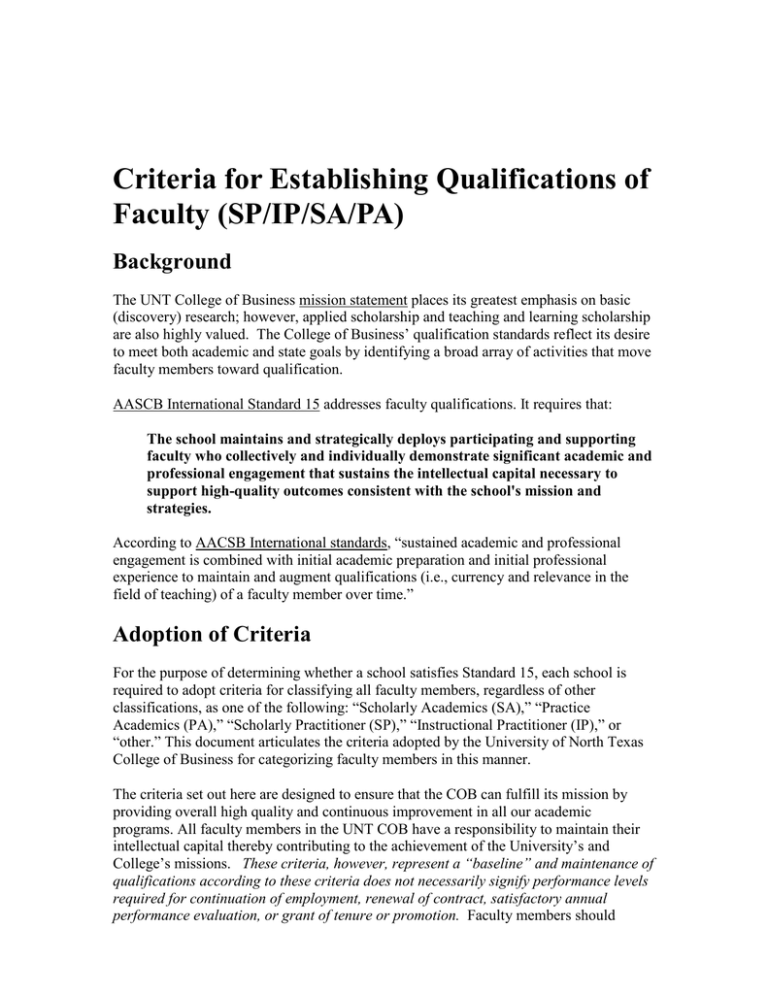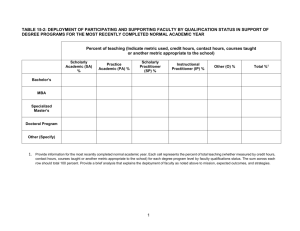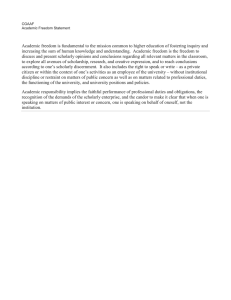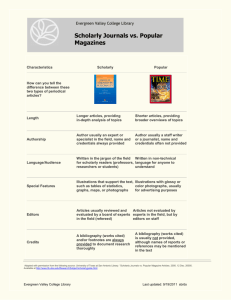Criteria for Establishing Qualifications of Faculty (SP/IP/SA/PA) Background
advertisement

Criteria for Establishing Qualifications of Faculty (SP/IP/SA/PA) Background The UNT College of Business mission statement places its greatest emphasis on basic (discovery) research; however, applied scholarship and teaching and learning scholarship are also highly valued. The College of Business’ qualification standards reflect its desire to meet both academic and state goals by identifying a broad array of activities that move faculty members toward qualification. AASCB International Standard 15 addresses faculty qualifications. It requires that: The school maintains and strategically deploys participating and supporting faculty who collectively and individually demonstrate significant academic and professional engagement that sustains the intellectual capital necessary to support high-quality outcomes consistent with the school's mission and strategies. According to AACSB International standards, “sustained academic and professional engagement is combined with initial academic preparation and initial professional experience to maintain and augment qualifications (i.e., currency and relevance in the field of teaching) of a faculty member over time.” Adoption of Criteria For the purpose of determining whether a school satisfies Standard 15, each school is required to adopt criteria for classifying all faculty members, regardless of other classifications, as one of the following: “Scholarly Academics (SA),” “Practice Academics (PA),” “Scholarly Practitioner (SP),” “Instructional Practitioner (IP),” or “other.” This document articulates the criteria adopted by the University of North Texas College of Business for categorizing faculty members in this manner. The criteria set out here are designed to ensure that the COB can fulfill its mission by providing overall high quality and continuous improvement in all our academic programs. All faculty members in the UNT COB have a responsibility to maintain their intellectual capital thereby contributing to the achievement of the University’s and College’s missions. These criteria, however, represent a “baseline” and maintenance of qualifications according to these criteria does not necessarily signify performance levels required for continuation of employment, renewal of contract, satisfactory annual performance evaluation, or grant of tenure or promotion. Faculty members should review relevant university, college and departmental policies and guidelines to determine expectations and requirements for these other purposes. The criteria for evaluating faculty qualifications, as adopted by the UNT College of Business and in accordance with AACSB Standard 15 follow. For each of the four qualification classifications, the criteria identify the initial credentials necessary, as well as the level and types of engagement necessary to maintain that qualification over time. For the purpose of establishing explicit standards for maintenance of qualifications, a “Point Value Table” has been included which lists the various types of relevant activities and categorizes those activities by type (academic or professional engagement) and importance, with higher point values assigned to higher value activities. Scholarly Academics (SA) Scholarly Academic status normally applies to faculty members who meet both the Initial Qualification standards and have maintained currency and relevance through scholarship and related. It should be emphasized that the College of Business expects all tenured and tenure track faculty members to strive to maintain the SA status rather than PA or any of the other Qualification types. Initial Qualification -- Faculty members who satisfy one of the following criteria will be qualified as Scholarly Academics: • • • • • • • Faculty members who hold a doctoral degree in the area in which they teach, for a period of five years following the degree award. A doctoral degree in Business Administration and in the area of their primary teaching responsibilities. A doctoral degree in Business Administration that is not in their primary area of teaching responsibilities with development activities that directly relate to the teaching field, including intellectual contributions, professional participation, consulting or other professional development activities that relate to their primary area of teaching responsibilities. A doctoral degree outside of Business Administration but related to their primary area of teaching responsibilities, or a graduate degree in law, or professional development activities that relate to the primary area of teaching responsibilities. A doctoral degree outside of Business Administration with either significant professional development activities that support the teaching field, including additional coursework in the teaching field, or professional development activities that include intellectual contributions, work experience, participation in professional or academic meetings, consulting, or other related professional development activities. A specialized graduate degree in taxation, or a combination of a graduate degree in law and accounting focused on taxation. Doctoral students who have completed all but their dissertation (ABD) in their program of study, for a period of three years beyond their most recently completed graduate comprehensive examination or other milestone that put the student in the dissertation stage. • Faculty members who hold a doctoral degree in an area other than the area in which they teach may be qualified, but may need supplemental preparation or other credentials. For these faculty members, a current research record in the teaching field will be accepted as satisfactory evidence of academic qualifications. Maintenance of Status as a Scholarly Academic: Maintaining status as a Scholarly Academic involves ongoing, sustained, and substantive academic engagement activities of the types shown in Groups A, B and C of the attached Point Value Table, with a primary emphasis on the production of peer reviewed journal articles. At the UNT College of Business, to maintain Scholarly Academic status, faculty members must publish at least 2 peer- reviewed journal articles during the previous five year period. The must engage in activities that total a minimum of 60 points in the previous five years, using the point scale from the Point Value Table below. Of the required 60 points: • • A minimum of 40 points must be derived from the publishing of peer reviewed journal articles or being funded on a research grant i as listed in Group A. Remaining points may be derived from any of the activities listed in Groups A, B or C. Practice Academic (PA) Practice Academic status applies to faculty members that augment their initial preparation as academic scholars with development and engagement activities that involve substantive linkages to practice, consulting, and other forms of professional engagement, based on the faculty members’ earlier work as an SA faculty member. Initial Qualification -- Faculty members in the College of Business who meet both of the following conditions will be qualified as a Practice Academics: • • Hold a doctoral degree in the area in which they teach, or otherwise met the requirements to qualify as a SA at one time, and Substantial engagement in professional development and other professional activities that is clearly linked to the field in which they will teach. Maintenance of status as a Practice Academic: Maintaining status as a Practice Academic may involve a variety of professional engagement activities involving ongoing, sustained and substantial interaction with business and industry, related to the field in which the faculty member is teaching, of the types listed in Groups D, E and F of the Point Value Table. These activities may be supplemented with academic engagement activities of the types listed in Groups A, B and C. At the UNT College of Business, to maintain PA status, faculty members must engage in activities that total a minimum of 50 points in the previous five years, using the point scale from the Point Value Table below. Of the required 50 points: • • A minimum of 30 points must be derived from professional engagement activities listed in Groups D, E, or F or from the production of intellectual contributions that are contributions to practice. The remaining points may come from any of the activities listed in any of the categories on the Point Value Table. Scholarly Practitioner (SP) Scholarly Practitioner status applies to faculty members who hold both an academic degree in a field related to their teaching as well as substantial professional experience, in terms of duration and level of responsibility. While a scholarly practitioner generally does not hold a doctoral degree, they sustain currency and relevancy through significant academic or scholarly engagement in their field of teaching. Initial Qualification -- Faculty members in the College of Business who meet all of the following conditions will be qualified as Scholarly Practitioners: • • • An advanced degree (typically a Master’s) in business or a business related discipline, related to the area in which they teach; and Substantial professional experience, in terms of duration (at least 5 years) and level of responsibility, in a business or other enterprise operated in accord with business management principles; and The faculty member has engaged in significant academic engagement activities related to their field of teaching over the previous 5 years. Maintenance of Status as a Scholarly Practitioner: Maintaining status as a Scholarly Practitioner involves ongoing, sustained, and substantive academic engagement activities of the types described in Groups A, B and C of the Point Value Table. At the UNT College of Business, to maintain SP status, faculty members must engage in activities that total a minimum of 50 points in the previous five years, using the point scale from the Point Value Table below. Of the required 50 points: • • A minimum of 30 points must be derived from intellectual contributions of the types listed in Groups A or B of the Point Value Table. The remaining 20 points may be derived from any of the activities listed in the Point Value Table. Instructional Practitioner (IP) Instructional Practitioner status applies to faculty members who hold both an academic degree in a field related to their teaching, as well as substantial professional experience. Instructional Practitioners sustain their currency and relevancy through continued work as a business professional or through professional engagement activities related to their professional background and their field of teaching. Initial Qualification -- Faculty members in the College of Business who meet all of the following conditions will be qualified as Instructional Practitioners: • • An advanced degree (typically a Master’s) in business or a business related discipline, related to the area in which they teach; and Substantial professional experience, in terms of duration (at least 5 years) and level of responsibility, in a business or other enterprise operated in accord with business management principles. Maintenance of Status as an Instructional Practitioner: Maintaining status as an Instructional Practitioner involves ongoing, sustained, and substantive professional engagement activities, primarily of the types listed in Groups D, E, and F of the Point Value Table. At the UNT College of Business, to maintain IP status, faculty members must engage in activities that total a minimum of 50 points in the previous five years, using the point scale from the Point Value Table below. Of the required 50 points, • • A minimum of 30 points must be derived from professional engagement activities of the types listed in Groups D, E, or F of the Point Value Table. The remaining 20 points may be derived from any of the activities listed in the Point Value Table. Academic and Professional Engagement Point Value Table for Maintenance of Qualifications GROUP A Academic Engagement Points Activity 30 Peer reviewed journal article in the departments’ A lists. ii 30 Receipt of funding from a national funding agency (AFOSR, ARO, ONR, HHS, EPA, DOE, FAA, NASA, NIH, NOAA, NSF, NIFA, ED, NEH, NEA, AHA, ACS ) for a research project. 20 Peer reviewed journal article in the departments’ B lists. iii 10 Other peer reviewed journal articles (typically listed in Cabell’s or other major directory of peer reviewed journals). 10 Other scholarly publications: iv (peered reviewed and publicly available) • • GROUP B Academic Engagement • • 5 Research Monographs, scholarly books, chapters in scholarly books, textbooks, or a practitioner periodical, publications in trade journals Authoring a significant part of a major public policy analysis conducted through or on behalf of the University Conducting a significant part of a funded research project including major contribution to a final written report or product Peer-reviewed proceedings from scholarly meetings Other intellectual contributions v (publicly available and available for scrutiny by peers) • • • • Papers presented at academic or professional meetings, nonpeer-reviewed proceedings, publicly available research working papers, papers presented at faculty research seminars, in-house journals, book reviews, written cases with instructional materials, instructional software, and other published instructional materials Authorship of a minor report, or a minor portion of a report, resulting from sponsored research Relevant active editorship with an academic journal (per issue) Relevant active service on editorial boards or committees of an academic journal (per year) 5 • GROUP C Academic Engagement • • • • • • 20 • • GROUP D Professional Engagement • • • • • Leadership or other significant participation in recognized academic societies and associations (per year) Significant research award Discipline based invited presentation to national or regional audience of business academics or practitioners Authorship of a grant proposal other than those covered in Group A Development - for each 5 hours spent attending sessions at academic conference(s) or at seminar sessions providing discipline-related professional development Reviewing activity for Journal or Conference/Meeting Authoring a regular column or book review that appears in an academic/scholarly related newsletter or publication that utilizes disciplinary expertise and appears in at least 3 issues Consulting - For each 40 hours of discipline-related private consulting Faculty Internship - for each four week period working (paid or unpaid) full-time for a business on a discipline-related project. Delivery of Executive Education Program - For every 4 hours spent delivering a continuing education session or seminar that has been certified for credit by a professional or industry or trade group Continued professional (non-academic) work in the discipline – for each 6 months in which the faculty member is employed at least .25 FTE (including ownership of a business with substantial annual revenues) Obtaining new professional certification or licensure, requiring annual academic coursework or continuing education that is related to the area of teaching responsibility Pedagogical or practitioner research published in trade or professional journal that is related to the area of teaching responsibility Receipt of funding to conduct a practice related research project. 10 • GROUP E Professional Engagement • • • • • 5 • GROUP F Professional Engagement • • • • • Participation in professional events focused on business, management or related issues For each year served as a member of a board of directors for a for-profit business or a substantial not-for-profit organization Publishing of a discipline-related newsletter or sequence of reports that attract a regional subscription base or regional industry distribution Leadership role in a professional organization focused on business, management or related issues Other significant activities that require substantial interaction with business or other organizational leaders Presentation at a national or regional trade or professional meeting related to the area of teaching responsibility Relevant active editorship with a professional or business (practitioner) journal or trade publication (per year) Relevant active service on editorial boards or committees of a professional journal or other business or trade publication for (per year) Professional Development - for each 5 hours spent attending sessions at academic or professional conference(s) or at seminar sessions providing discipline-related professional development For each hour of presentation time devoted to the delivery of an invited presentation or training session on a topic relevant to the faculty member’s discipline, to business, trade groups, government or non-profit groups Authoring a regular newspaper column that utilizes disciplinary expertise and appears in at least 5 issues Serving as an expert witness in cases related to the area of teaching responsibility i Peer reviewed journal articles are intellectual contributions that have appeared in journal article form and were reviewed by academic and practitioner colleagues. Peer reviewed journal articles are typically articles published in academic journals listed in one of Cabell’s Directories of Publishing Opportunities or a similar type of academic directory. If the publication is not listed in a Cabell’s Directory, it is the faculty member’s responsibility to provide documentation of the review process. ii These journals are widely recognized as top journals in a discipline. Their status must be documented by published studies of journal rankings. To encourage cross-disciplinary collaboration, faculty will be credited for articles published in the elite top tier journals of another discipline in the College, as well as their own. iii Targeted high quality journals are journals so designated by the faculty in each discipline within the College because the journals fit the University/College/Departmental mission and are widely recognized as quality journals. Faculty members in each discipline can nominate journals and make a case for their inclusion in the list. To be included a majority of the faculty members in the discipline must agree. To encourage cross-disciplinary collaboration, faculty will be credited for articles published in the targeted high quality journals of another discipline in the College, as well as their own. iv A “scholarly publication” is an intellectual contribution that meets the following requirements: (1) it was subjected to a documented formal peer or editorial review process; and (2) it is readily available for public scrutiny in a library or through an on-line retrieval service (not self-published). v Intellectual contributions are publically available for scrutiny by academic peers or practitioners, i.e., proprietary and confidential research and consulting reports do not qualify as intellectual contributions.



